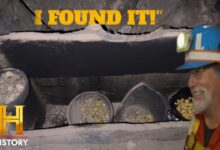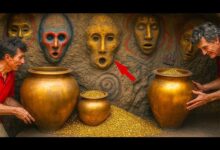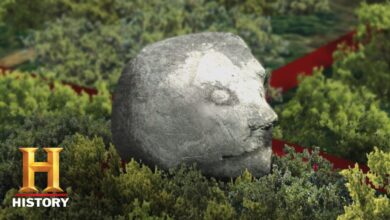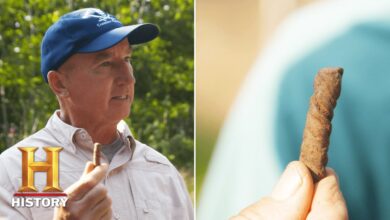Oak Island Excavation Site Shut Down After Finding Something TERRIFYING
Oak Island Excavation Site Shut Down After Finding Something TERRIFYING

Tony, we’ll see you on the boat soon.
Over.
All right, I’d say that was a successful dive.
Very.
What makes these artifacts interesting is they’re similar to the artifacts that they’re finding on land, so either they came—
Oak Island’s excavation site recently gained a lot of global attention when researchers made a shocking discovery, leading to the abrupt shutdown of the operation.
This discovery has not only sparked more interest in Oak Island’s mystery, but has also raised questions about the true nature of the island’s secrets.
Oak Island, a small island situated in Nova Scotia, Canada, has had a long trail of treasure hunters, historians, and conspiracy theorists obsessing over it.
It is best known for The Money Pit, a legendary ground zero for treasure that has avoided discovery for generations.
Even though this is the final can, we’re not going to give up.
We know that there is a tell in the 90ft horizon.
All that tunnel means we’re close to finding the original Money Pit.
The attraction of Oak Island lies in the promise of hidden riches and the countless efforts made over the years to uncover its secrets.
The recent excavation on Oak Island was a carefully planned operation led by a dedicated team including the Lagina brothers, who were bent on uncovering the island’s history.
Their journey began with the excavation of a series of shafts, each one taking them deeper into the mysteries hidden beneath the island’s surface.
One of the most shocking moments in the excavation occurred when the team reached a depth of 90 ft in the B4C shaft.
“The hope is that once we get down 50–60 ft, we’ll be able to drill horizontally.”
“Vertically?”
“Yep, then hopefully we do find a tunnel from this shaft.”
At this point, they unearthed chilling traces of silver and gold.
This discovery raised intense discussion about the nearness of the fabled Money Pit or the existence of a hidden treasure chamber.
The air around Oak Island grew thick with suspense as the line between truth and myth blurred.
Despite their determination, the team faced unexpected challenges.
At a depth of around 130 ft in the B4C shaft, they came across a bedrock formation that halted their progress.
“If there is some sort of connection here, they need to know it, and we need to know it.”
“If we get lucky, this will tell us.”
This geological barrier suddenly halted their advance, pushing them into uncertainty.
Nevertheless, the team remained committed in their journey to uncover the island’s secrets.
The team’s determination led to another remarkable discovery—a paved area in the swamp.
This oddity left experts amazed.
Furthermore, a 500-year-old stone road was unearthed, shedding light on the island’s ancient history and intensifying the attractions surrounding its secrets.
One of the most inspiring discoveries came in the form of a rock drill discovered within the B4C shaft, believed to date back to the mid-15th century.
“What have we got here?”
“What the hell is that?”
“The size of that… that is one big spike.”
“Look at the size of that!”
“That’s a railroad spike.”
“No…”
This artifact gave birth to theories about a concealed history or priceless treasures hidden on the island.
As the team continued their exploration, they used cutting-edge ground-penetrating radar technology to scan the swamp’s surface.
These scans revealed a network of interconnected tunnels beneath the swamp, suggesting that these passageways could be the key to unlocking Oak Island’s final secrets.
Armed with specialized tools and protective gear, the team fearlessly traveled into the recently uncovered tunnels.
Inside, the air was heavy with dampness.
They came across remains of tools, solid proof of human presence, and mysterious symbols carved onto the tunnel walls.
“It’s always said that, you know, science had to be a real component of the search, and now this analysis is incredibly invigorating.”
“Look at the smile growing on the table—I mean, everybody’s smiling.”
The determined efforts of the Lagina Brothers led to another important yet terrifying discovery—a huge stone slab hidden 10 ft below the Earth’s surface.
This stone displayed complex patterns carved into its surface and was unearthed during the excavation in Smith’s Cove, an important area believed to hold historical riches.
After endless attempts, their patience paid off in the Money Pit area, near the Garden Shaft.
During their exploration, the Lagina Brothers came across a strange pink substance on a water slide in the Money Pit area.
They guessed that it might point out the presence of a sizable hidden gold deposit.
To investigate further, Spooner, a member of their team, collected water samples in plastic bottles from around the Money Pit.
The goal was to determine if gold was present and, if so, to pinpoint its exact location.
“What we just hope is we get a nice clear sample.”
“We’ll just trial it in. What we’re trying to do is find the bull’s-eye on the dartboard that is The Money Pit.”
The mysterious gel-like material appeared unusual, displaying a pink color and jelly-like texture, raising questions about its composition.
According to Spooner and his team, their theory suggests that the pink substance could be a concentrated form of gold.
It might have formed when gold at first dissolved in water and then precipitated upon evaporation.
Experts believe the blob likely consists of a mixture of gold, iron, and sulfur.
This combination potentially came from an organic gold deposit within Oak Island, with the surrounding soil providing the necessary chemicals for its formation.
However, the exact composition of the pink substance continues to be a topic of ongoing investigation and clarification.
“That looks great. Ready? Let’s get the data off, get some results back.”
“There you go, Matt.”
In the recent episodes of The Curse of Oak Island, viewers were treated to some more exciting and terrifying discoveries.
It all began on Lot 5, where a fascinating feature was uncovered.
Among the findings were ancient pottery and a medieval spike that was found near the swamp.
Marty Lagina, in a light-hearted moment, jokingly wondered whether the island’s long-held secret might be hiding in a small plastic bottle.
Despite the two centuries of large-scale efforts and expenses invested in the War Room, during their meeting, Marty eagerly asked about the progress on finding gold—
and the new news was encouraging.
Dr. Dred Michelle, a hydrogeologist, revealed that the hidden gold was not too far from the sea.
He roughly calculated its depth to be between 80 and 110 ft.
This finding was in line with earlier discoveries by researchers who had come across an engraved stone at about 90 ft, suggesting a potential location for the treasure.
The Onslow employees began excavating through a level platform or an unidentified vault structure, but their efforts were hampered by flooding in the shaft.
In this episode, they guessed that they might have come across the treasure vault.
Marty and his brother Rick Lagina discussed the possibility of investigating it immediately.
Marty added a touch of humor by referring to the exploration of the pink blob as “onward and into the blob,” expressing the team’s excitement to continue their investigations
once the Dumas Mining Company obtains the necessary permits to resume the excavation of the Garden Shaft.
Over on Lot 5, Gary Drayton, the metal detectorist, made a fascinating discovery of pottery,
leading to Laird Niven and his team of archaeologists taking charge of the operation.
They uncovered a stone building that appeared to have been deliberately buried, and it was filled with a wealth of pottery dating back to the period between 1650 and 1750.
The pottery, beautifully ornamented and tin-glazed, gave Laird reason to believe it had English origins.
However, the question remains as to why it was buried in an area that appeared to be unoccupied.
Continuing in the episode, the team exploring Lot 32 stumbled upon a unique wharf on the island’s western side, believed to have been used by the French during the 1700s.
This well-preserved wharf, constructed with huge wooden timbers, hints at the presence of a community on Oak Island during that time.
The discovery provides further evidence of the island’s past as a major colony where people lived, worked, and engaged in trade activities.
The Dumas Mining firm is gearing up to go 82 ft down the Garden Shaft, and the team is filled with excitement for the progress that lies ahead.
The excitement is growing as the Dumas team begins the process of recovering the original timbers for post-repair.
Initially believed to be a 19th-century search shaft, carbon-14 dating has now thrown the possibility that it dates back even further, possibly to the time of the original treasure depositors.
While the team hasn’t yet come across hidden riches or offset rooms, they continue to discover gold and silver signatures in the wood.
This ongoing discovery fuels their determination to continue their search without missing a beat.
The unknown terrain of Oak Island remains their central focus, driving them to uncover any potential treasures it might hold.
In July 2023, another terrifying discovery was made by the Lagina brothers and their team.
On their island, they stumbled upon a stone structure in the Oak Island swamp which looks quite similar to the original Money Pit treasure shaft’s design.
This structure consists of large cut stones stacked in a spiral pattern, hinting at potential ancient ties to Italy, where such spiral designs were common in Roman architecture.
Although the excavation of this structure is ongoing, its importance lies in its potential to provide new insights into the origins of the Oak Island treasure.
Another noteworthy find is a lead cross, similar to one found at Smith’s Cove in 2020.
This discovery of the lead cross suggests the possibility of religious activity being practiced on the island for centuries.
The team is excavating the lead cross, hoping it may give them fresh information about the source of the Oak Island treasure.
As they dive deeper into these discoveries, the Lagina brothers and their crew maintain their eagerness to uncover the mysteries hidden beneath Oak Island’s surface in the months to come.
In a surprising turn of events, the team also came across a surprising quantity of cobblestones near the Oak Island swamp.
These cobblestones, along with the Roman-style stone building and the lead cross, raise questions about the swamp’s potential significance.
It is assumed that these cobblestones were brought to the island, as they did not originate on Oak Island, and they might have been used to construct a boardwalk or pier in the marsh.
This discovery hints at the possibility of significant human activity in the swamp area in the past.
“I like this area right here. It’s got cobblestone and big stone. It hasn’t been disturbed yet.
So just keep a diligent eye on that. Little pieces can give us a lot of information.”
As is their tradition, the team will present their significant archaeological finds on the table in the War Room at the end of each season.
This season’s finale will likely feature an emotional moment, with Lagina giving a heartfelt and motivational speech,
expressing gratitude to everyone for their hard work and commitment.
The recent shutdown of the Oak Island excavation due to a terrifying discovery has left us all wondering about the nature of this revelation.
What are your theories about what the team might have found?
Do you believe it’s a significant clue related to the island’s legendary treasure, or could it uncover an entirely different aspect of Oak Island’s history?








